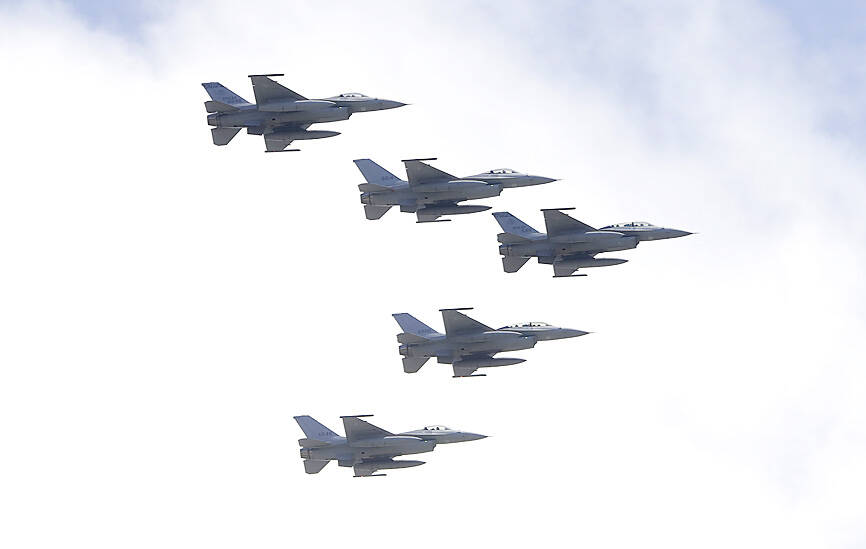Washington informed Taiwan that it has approved a package of up to US$619 million for equipment and munitions related to F-16 jets, the Ministry of Foreign Affairs (MOFA) said yesterday.
The US Department of State notified the US Congress that it has approved the sale, which is likely to pass a vote in Congress within in a month, the Ministry of National Defense said in a statement.
The defense ministry expressed its “sincere gratitude” to the US for approving the sale.

Photo: AP
The package would provide 100 AGM-88B high-speed anti-radiation missiles (HARM), 23 HARM training missiles, 200 AIM-120C-8 advanced medium-range air-to-air missiles (AMRAAM), four AIM-120C-8 AMRAAM guidance systems and 26 LAU-129 multi-purpose launchers, the US Defense Security Cooperation Agency said.
Other munitions and equipment in the package include LAU-118A missile launchers with an aircraft launcher interface computer, HARM missile containers, AIM-120 control sections and containers, AIM-120C captive air training missiles, dummy air training missiles, integration and test support and equipment, and other related elements of logistical and program support, it added.
The main contractors of the missiles would be Raytheon Technologies Corp and Lockheed Martin Corp.
The defense ministry said that the air force has completed combat capability assessments with the AGM-88B and AIM-120C-8 missiles, which are able to further strengthen the defense capabilities protecting Taiwan’s airspace.
The sale also demonstrates Taiwan’s ability to predict the nation’s combat needs and strengthen its armed forces accordingly, it added.
Taiwan is “preparing for war, but not asking for war,” and is determined to boost its self-defense capabilities, the defense ministry said.
The sale is highly welcome, MOFA spokesman Jeff Liu (劉永健) told a news conference yesterday.
The foreign ministry thanked the US for fulfilling its promise in the Taiwan Relations Act and the “six assurances,” he said.
This is the first military sale announced this year by US President Joe Biden’s administration and the eighth in his term, Liu said.
The US continues to normalize arms sales to Taiwan, helping the nation to obtain defense equipment in a timely manner and enhance combat capabilities, he said.
In the face of China’s military expansion, Taiwan would continue to improve its self-defense capabilities and deepen its security relationship with the US, he said.
The sale comes as the defense ministry yesterday reported a second day of large-scale Chinese air force incursions into the nation’s air defense identification zone, with 21 aircraft spotted over 24 hours ending yesterday morning.
The aircraft, 17 J-10 fighters and four J-16 fighters, flew into the southwestern corner of the zone, a defense ministry graphic showed.
The J-10s, an older model that entered service two decades ago, flew closer to the Chinese coast than Taiwan’s, while the J-16s, a much newer and more advanced fighter, flew northeast of the Pratas Islands (Dongsha Islands, 東沙群島), the graphic showed.
Taiwanese air force jets were sent to monitor the Chinese aircraft, the ministry said.
The ministry on Wednesday reported 19 Chinese aircraft flying in the zone.
None of the aircraft crossed the median line of the Taiwan Strait, although 10 Chinese aircraft crossed the line on Friday last week.
Additional reporting by Reuters

MAKING WAVES: China’s maritime militia could become a nontraditional threat in war, clogging up shipping lanes to prevent US or Japanese intervention, a report said About 1,900 Chinese ships flying flags of convenience and fishing vessels that participated in China’s military exercises around Taiwan last month and in January have been listed for monitoring, Coast Guard Administration (CGA) Deputy Director-General Hsieh Ching-chin (謝慶欽) said yesterday. Following amendments to the Commercial Port Act (商港法) and the Law of Ships (船舶法) last month, the CGA can designate possible berthing areas or deny ports of call for vessels suspected of loitering around areas where undersea cables can be accessed, Oceans Affairs Council Minister Kuan Bi-ling (管碧玲) said. The list of suspected ships, originally 300, had risen to about 1,900 as

Japan’s strategic alliance with the US would collapse if Tokyo were to turn away from a conflict in Taiwan, Japanese Prime Minister Sanae Takaichi said yesterday, but distanced herself from previous comments that suggested a possible military response in such an event. Takaichi expressed her latest views on a nationally broadcast TV program late on Monday, where an opposition party leader criticized her for igniting tensions with China with the earlier remarks. Ties between Japan and China have sunk to the worst level in years after Takaichi said in November that a hypothetical Chinese attack on Taiwan could bring about a Japanese

The WHO ignored early COVID-19 warnings from Taiwan, US Deputy Secretary of Health and Human Services Jim O’Neill said on Friday, as part of justification for Washington withdrawing from the global health body. US Secretary of State Marco Rubio on Thursday said that the US was pulling out of the UN agency, as it failed to fulfill its responsibilities during the COVID-19 pandemic. The WHO “ignored early COVID warnings from Taiwan in 2019 by pretending Taiwan did not exist, O’Neill wrote on X on Friday, Taiwan time. “It ignored rigorous science and promoted lockdowns.” The US will “continue international coordination on infectious

DEEP-STRIKE CAPABILITY: The scenario simulated a PLA drill that turned into an assault on Taiwan’s critical infrastructure, with the launchers providing fire support Taiwan yesterday conducted this year’s first military exercises at Longsiang Base in Taichung, demonstrating the newly acquired High Mobility Artillery Rocket System’s (HIMARS) ability to provide fire support and deep-strike capabilities. The scenario simulated an attack on Penghu County, with HIMARS trucks immediately rolling into designated launch areas and firing barrages at the Wangan (望安) and Cimei (七美) islands, simulating the provision of fire support against invading forces. The HIMARS are supposed to “fire and leave,” which would significantly increase personnel and equipment survivability, a military official said. The drill simulated an exercise launched by the Chinese People’s Liberation Army (PLA) Eastern